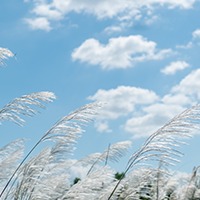Born in the pre-independence era, I spent an exciting childhood in Naogaon of Rajshahi district of undivided Bengal. It was by the side of River Yamuna, a tributary of the Ganges, and a developed city with schools and colleges. My maternal uncle’s house was just beside the river. Every monsoon, the overflowing rivers used to inundate the houses and as children we would enjoy it from our first-floor balcony, especially the fish swimming around the courtyard. Another attraction was the big country boats sailed by the boatmen and the melodious tunes of their songs.
In our house, the vegetarian and non-vegetarian kitchens were separated and those were always outside the main building. Electricity was out of the question and so all the children had to study under the light of the hurricane lamp. That was also a lot of fun, as we used to sit in a circle and read aloud together. Sleeping in the same bed, bathing in the river together—all of this forged a strong beyond bond between us. Sometimes we were so engrossed in bathing that we used to forget the time and get late. As a strict rule, the main door closed at a particular time and if we got late, we had to climb the boundary wall and enter through the windows and for that we were strictly punished by the elders.
I remember an incident when I was almost kidnapped by a kabuliwala, as we used to call them at the time. As evident, he hailed from Kabul and I was very fascinated by his large black bag full of dates and the stories of his country. We always wanted to visit his country, so one day he took us with him—a boy from our neighbourhood and me on his bicycle, probably with the bait of taking us to his country. We were very young to understand what was happening and accompanied him. While walking on the railway track, a few village boys noticed us and came shouting and running, and we were saved by the timely intervention.
Then came World War II when we had to shift to our village home, which had been empty for quite a long time. However, it was an interesting house with a secret tunnel that connected to the river. It was told that it was the escape route for the soldiers during the Battle of Plassey.
Another time of year that was very dear to me was Durga Puja. The fields full of flowers, especially the kash phool (white feathery flowers), the smell of naarkel naru, a Bengali delicacy made with coconut and jaggery, just after Durga Puja…everything is fresh in my mind.
I still miss the simple but lovely childhood days.
Want to share your experience? Please mail your story to writetous@supportelders.com with your name


